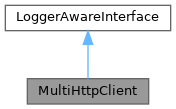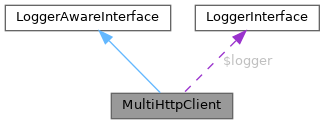Class to handle multiple HTTP requests. More...


Public Member Functions | |
| __construct (array $options) | |
| Since 1.35, callers should use HttpRequestFactory::createMultiClient() to get a client object with appropriately configured timeouts instead of constructing a MultiHttpClient directly. | |
| __destruct () | |
| run (array $req, array $opts=[]) | |
| Execute an HTTP(S) request. | |
| runMulti (array $reqs, array $opts=[]) | |
| Execute a set of HTTP(S) requests. | |
| setLogger (LoggerInterface $logger) | |
| Register a logger. | |
Protected Member Functions | |
| getCurlHandle (array &$req, array $opts) | |
| getCurlMulti (array $opts) | |
| isCurlEnabled () | |
| Determines if the curl extension is available. | |
Protected Attributes | |
| string null | $caBundlePath |
| SSL certificates path. | |
| resource | $cmh |
| curl_multi_init() handle | |
| float | $connTimeout = 10 |
| LoggerInterface | $logger |
| int | $maxConnsPerHost = 50 |
| float | $maxConnTimeout = INF |
| float | $maxReqTimeout = INF |
| string null | $proxy |
| proxy | |
| float | $reqTimeout = 30 |
| bool | $usePipelining = false |
| string | $userAgent = 'wikimedia/multi-http-client v1.0' |
Private Member Functions | |
| getSelectTimeout ( $opts) | |
| Get a suitable select timeout for the given options. | |
| normalizeRequests (array &$reqs) | |
| Normalize request information. | |
| runMultiCurl (array $reqs, array $opts) | |
| Execute a set of HTTP(S) requests concurrently. | |
| runMultiHttp (array $reqs, array $opts=[]) | |
| Execute a set of HTTP(S) requests sequentially. | |
Private Attributes | |
| const | TIMEOUT_ACCURACY_FACTOR = 0.1 |
Detailed Description
Class to handle multiple HTTP requests.
If curl is available, requests will be made concurrently. Otherwise, they will be made serially.
HTTP request maps are arrays that use the following format:
- method : GET/HEAD/PUT/POST/DELETE
- url : HTTP/HTTPS URL
- query : <query parameter field/value associative array> (uses RFC 3986)
- headers : <header name/value associative array>
- body : source to get the HTTP request body from; this can simply be a string (always), a resource for PUT requests, and a field/value array for POST request; array bodies are encoded as multipart/form-data and strings use application/x-www-form-urlencoded (headers sent automatically)
- stream : resource to stream the HTTP response body to
- proxy : HTTP proxy to use
- flags : map of boolean flags which supports:
- relayResponseHeaders : write out header via header() Request maps can use integer index 0 instead of 'method' and 1 instead of 'url'.
Since 1.35, callers should use HttpRequestFactory::createMultiClient() to get a client object with appropriately configured timeouts.
- Since
- 1.23
Definition at line 55 of file MultiHttpClient.php.
Constructor & Destructor Documentation
◆ __construct()
| MultiHttpClient::__construct | ( | array | $options | ) |
Since 1.35, callers should use HttpRequestFactory::createMultiClient() to get a client object with appropriately configured timeouts instead of constructing a MultiHttpClient directly.
- Parameters
-
array $options - connTimeout : default connection timeout (seconds)
- reqTimeout : default request timeout (seconds)
- maxConnTimeout : maximum connection timeout (seconds)
- maxReqTimeout : maximum request timeout (seconds)
- proxy : HTTP proxy to use
- usePipelining : whether to use HTTP pipelining if possible (for all hosts)
- maxConnsPerHost : maximum number of concurrent connections (per host)
- userAgent : The User-Agent header value to send
- logger : a \Psr\Log\LoggerInterface instance for debug logging
- caBundlePath : path to specific Certificate Authority bundle (if any)
- Exceptions
-
Exception
Definition at line 102 of file MultiHttpClient.php.
◆ __destruct()
| MultiHttpClient::__destruct | ( | ) |
Definition at line 636 of file MultiHttpClient.php.
Member Function Documentation
◆ getCurlHandle()
|
protected |
- Parameters
-
array &$req HTTP request map
-param array{url:string,proxy?:?string,query:mixed,method:string,body:string|resource,headers:string[],stream?:resource,flags:array} $req
- Parameters
-
array $opts - connTimeout : default connection timeout
- reqTimeout : default request timeout
- Returns
- resource
- Exceptions
-
Exception
Definition at line 305 of file MultiHttpClient.php.
References $header, and $matches.
Referenced by runMultiCurl().
◆ getCurlMulti()
|
protected |
- Parameters
-
array $opts
- Returns
- resource
- Exceptions
-
Exception
Definition at line 435 of file MultiHttpClient.php.
References $cmh.
Referenced by runMultiCurl().
◆ getSelectTimeout()
|
private |
Get a suitable select timeout for the given options.
- Parameters
-
array $opts
- Returns
- float
Definition at line 611 of file MultiHttpClient.php.
References $connTimeout, and $reqTimeout.
Referenced by runMultiCurl().
◆ isCurlEnabled()
|
protected |
Determines if the curl extension is available.
- Returns
- bool true if curl is available, false otherwise.
Definition at line 200 of file MultiHttpClient.php.
Referenced by runMulti().
◆ normalizeRequests()
|
private |
Normalize request information.
- Parameters
-
array[] &$reqs the requests to normalize
Definition at line 566 of file MultiHttpClient.php.
Referenced by runMulti().
◆ run()
| MultiHttpClient::run | ( | array | $req, |
| array | $opts = [] ) |
Execute an HTTP(S) request.
This method returns a response map of:
- code : HTTP response code or 0 if there was a serious error
- reason : HTTP response reason (empty if there was a serious error)
- headers : <header name/value associative array>
- body : HTTP response body or resource (if "stream" was set)
- error : Any error string The map also stores integer-indexed copies of these values. This lets callers do: list( $rcode, $rdesc, $rhdrs, $rbody, $rerr ) = $http->run( $req );
- Parameters
-
array $req HTTP request array array $opts
- connTimeout : connection timeout per request (seconds)
- reqTimeout : post-connection timeout per request (seconds)
- usePipelining : whether to use HTTP pipelining if possible (for all hosts)
- maxConnsPerHost : maximum number of concurrent connections (per host)
- Returns
- array Response array for request
Definition at line 144 of file MultiHttpClient.php.
References runMulti().
◆ runMulti()
| MultiHttpClient::runMulti | ( | array | $reqs, |
| array | $opts = [] ) |
Execute a set of HTTP(S) requests.
If curl is available, requests will be made concurrently. Otherwise, they will be made serially.
The maps are returned by this method with the 'response' field set to a map of:
- code : HTTP response code or 0 if there was a serious error
- reason : HTTP response reason (empty if there was a serious error)
- headers : <header name/value associative array>
- body : HTTP response body or resource (if "stream" was set)
- error : Any error string The map also stores integer-indexed copies of these values. This lets callers do: All headers in the 'headers' field are normalized to use lower case names. This is true for the request headers and the response headers. Integer-indexed method/URL entries will also be changed to use the corresponding string keys.list( $rcode, $rdesc, $rhdrs, $rbody, $rerr ) = $req['response'];
- Parameters
-
array[] $reqs Map of HTTP request arrays array $opts Options - connTimeout : connection timeout per request (seconds)
- reqTimeout : post-connection timeout per request (seconds)
- usePipelining : whether to use HTTP pipelining if possible (for all hosts)
- maxConnsPerHost : maximum number of concurrent connections (per host)
- Returns
- array[] $reqs With response array populated for each
- Exceptions
-
Exception
Definition at line 177 of file MultiHttpClient.php.
References isCurlEnabled(), normalizeRequests(), runMultiCurl(), and runMultiHttp().
Referenced by run().
◆ runMultiCurl()
|
private |
Execute a set of HTTP(S) requests concurrently.
- See also
- MultiHttpClient::runMulti()
- Parameters
-
array[] $reqs Map of HTTP request arrays array $opts - connTimeout : connection timeout per request (seconds)
- reqTimeout : post-connection timeout per request (seconds)
- usePipelining : whether to use HTTP pipelining if possible
- maxConnsPerHost : maximum number of concurrent connections (per host)
-param array{connTimeout?:int,reqTimeout?:int,usePipelining?:bool,maxConnsPerHost?:int} $opts
- Returns
- array $reqs With response array populated for each
- Exceptions
-
Exception PhanTypeInvalidDimOffset
Definition at line 224 of file MultiHttpClient.php.
References getCurlHandle(), getCurlMulti(), and getSelectTimeout().
Referenced by runMulti().
◆ runMultiHttp()
|
private |
Execute a set of HTTP(S) requests sequentially.
- See also
- MultiHttpClient::runMulti()
- Todo
- Remove dependency on MediaWikiServices: use a separate HTTP client library or copy code from PhpHttpRequest
- Parameters
-
array $reqs Map of HTTP request arrays
-param array<int,array{url:string,query:array,method:string,body:string,proxy?:?string,headers?:string[]}> $reqs
- Parameters
-
array $opts - connTimeout : connection timeout per request (seconds)
- reqTimeout : post-connection timeout per request (seconds) -param array{connTimeout:int,reqTimeout:int} $opts
- Returns
- array $reqs With response array populated for each
- Exceptions
-
Exception
Definition at line 493 of file MultiHttpClient.php.
Referenced by runMulti().
◆ setLogger()
| MultiHttpClient::setLogger | ( | LoggerInterface | $logger | ) |
Register a logger.
- Parameters
-
LoggerInterface $logger
Definition at line 632 of file MultiHttpClient.php.
Member Data Documentation
◆ $caBundlePath
|
protected |
SSL certificates path.
Definition at line 59 of file MultiHttpClient.php.
◆ $cmh
|
protected |
curl_multi_init() handle
Definition at line 57 of file MultiHttpClient.php.
Referenced by getCurlMulti().
◆ $connTimeout
|
protected |
Definition at line 61 of file MultiHttpClient.php.
Referenced by getSelectTimeout().
◆ $logger
|
protected |
Definition at line 77 of file MultiHttpClient.php.
◆ $maxConnsPerHost
|
protected |
Definition at line 71 of file MultiHttpClient.php.
◆ $maxConnTimeout
|
protected |
Definition at line 63 of file MultiHttpClient.php.
◆ $maxReqTimeout
|
protected |
Definition at line 67 of file MultiHttpClient.php.
◆ $proxy
|
protected |
proxy
Definition at line 73 of file MultiHttpClient.php.
◆ $reqTimeout
|
protected |
Definition at line 65 of file MultiHttpClient.php.
Referenced by getSelectTimeout().
◆ $usePipelining
|
protected |
Definition at line 69 of file MultiHttpClient.php.
◆ $userAgent
|
protected |
Definition at line 75 of file MultiHttpClient.php.
◆ TIMEOUT_ACCURACY_FACTOR
|
private |
Definition at line 82 of file MultiHttpClient.php.
The documentation for this class was generated from the following file:
- includes/libs/http/MultiHttpClient.php